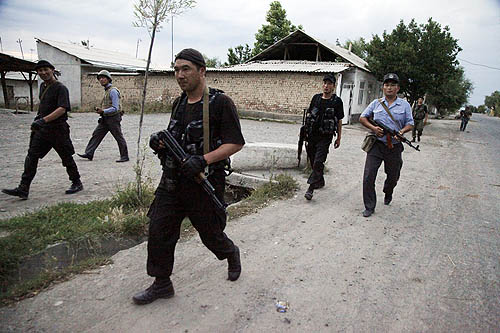|
 |
|
EMERGENCY CONTINUES: Kyrgyz policemen patrol the streets of the riot-hit southern city Osh on June 19. Kyrgyzstan's interim government has extended the state of emergency in the south until August 10 (XINHUA/AFP) |

On June 27, a constitutional referendum was held in Kyrgyzstan. The Central Election Commission announced two days later a new Constitution had been approved.
Some 2.72 million people were eligible to vote and the turnout was more than 70 percent. Of those who cast ballots, some 90 percent voted for the new Constitution and only 8 percent voted against it.
The referendum partly solved the dispute about the legitimacy of Kyrgyzstan's interim government led by Roza Otunbayeva. She was sworn in as Kyrgyzstan's caretaker president on July 3.
After former President Kurmanbek Bakiyev was ousted in early April, a government headed by Otunbayeva took control. The interim government decided to hold a constitutional referendum on June 27 and parliamentary elections on October 10. The purpose of its calling for a revision of the Constitution was to eliminate despotism, patriarchal rule and corruption.
The core of the new Constitution is to convert Kyrgyzstan from a presidential system to a parliamentary republic. Under the new Constitution, Kyrgyzstan will establish a parliamentary system, which diminishes the president's power and substantially increases parliamentary power.
To ensure a smooth referendum, the interim government took strict security measures. On June 27, more than 8,000 policemen, 7,500 volunteers and nearly 2,000 soldiers were sent to guard the more than 2,300 polling stations.
In the capital city Bishkek, and the Chui region where it is situated, 20,000 soldiers were deployed.
The referendum was to decide two issues: whether to approve the new Constitution and whether to agree with Otunbayeva's serving as Kyrgyzstan's president for a transitional period until the end of 2011.
Under the interim government's well-organized security measures and strong media campaign, the Kyrgyz people turned out in large numbers to vote. The 70-percent turnout was far above everybody's expectations.
On June 27, Otunbayeva—in the riot-hit southern city of Osh, the second largest city in Kyrgyzstan—said some people claimed the country had collapsed, but the success of the referendum had proven a strong counter.
After her inauguration, Otunbayeva will strengthen control over the domestic situation. Before the parliamentary elections in October, she will be both head of state and of the government, shouldering the responsibility of stabilizing the domestic situation and restoring the economy.
Parliamentary elections, in line with new constitutional provisions, will be held every five years. The president enjoys a six-year presidential term and is not allowed to serve a further term.
Otunbayeva's swearing in as president satisfied the public's desire to establish a legitimate government in Kyrgyzstan as quickly as possible.
Since April, Kyrgyzstan has been in political and social unrest. Otunbayeva's interim government set in place a series of measures to maintain stability. The causes of the riots were investigated and perpetrators were punished. Meanwhile, arrangements were made for refugees to come back to Kyrgyzstan. So far, a large number of refugees have returned to Osh and other areas in the south, where ethnic riots broke out. Further, the government is gradually rebuilding Osh and other riot-hit cities.
Otunbayeva said, at her swearing-in ceremony, the government's most pressing task was to strengthen solidarity among different ethnic groups, restore social order and improve living standards. This shows the new government will further intensify its efforts and the country will hopefully recover from the tensions of recent months and start to build a stable government.
Challenges
Because of a poor economy and complex social problems, it will be difficult for the new government to make achievements in the short term.
First, the parliamentary system is hard to implement. The revision by the interim government focused on changing the country's political institution. Previously, most of the powers were in the hands of the president. But the new Constitution advocates transferring the country's main decision-making power to the legislative branch. Judging from Kyrgyzstan's national conditions, it will be hard for the parliamentary system to take root.
There are presently quite a number of political parties in Kyrgyzstan, but the political party system is very weak. Of about 150 political parties, only six or seven are relatively strong, with clear political programs and standing in the interim government. They will obtain seats in the future parliament as well.
But Kyrgyzstan lacks the external conditions and a social basis featuring Western-style democracy for the formation of a political party system. In the past five years, all Kyrgyzstan's legislative procedures, including referendums, have failed to resolve its internal problems.
In addition, it will be very difficult to establish a coalition government. The country's parties mainly represent different regions and ethnic groups. They have no clear political proposals or long-term goals. As the interests of various regions are quite different, it will be hard to bring them to a unified viewpoint. The parliamentary system might therefore intensify political and ethnic conflicts, and lead major political forces into endless attempts to grab power.
| 